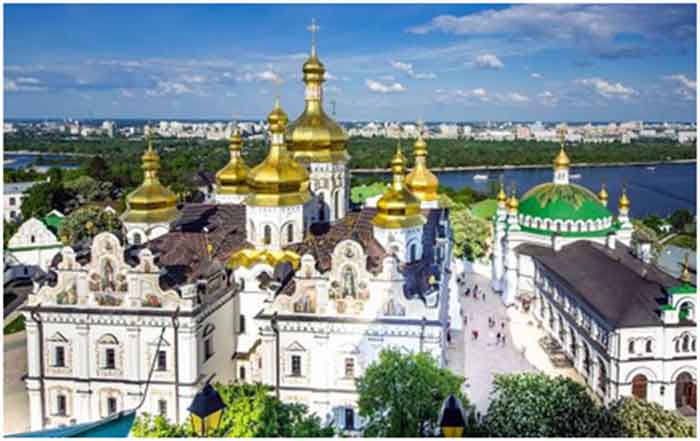“Footfalls echo in the memory/ Down the passage which we did not take/
Towards the door we never opened/ Into the rose-garden.”
(T. S. Eliot; from, “Four Quartets”)
1.
Recent, shattering world events, have prompted me to check my files to reconsider any past references I’d made to Ukraine. I found a short note to a correspondent/friend from about 10 years ago:
“I was there 1 or 2 years before the “Maidan [Independence Square] Revolution,” [of 2014] and I liked Kiev very much (my mother’s parents were from there!). A good-looking city… nice parks, river-views, gold-domed Eastern Orthodox churches. One heard Russian and Ukrainian, and at least during my 10 days-sojourn, I thought it a friendly place, people interacting well.”
I was there as a copy-editor, a minor, adjunct position in a global organization that tries to do a little good in this world. I was happy to learn, discern, and re-learn; to distill the essential….
My interest in Ukraine went back to my pre-teens—an awakening interest in history—general and personal. I finally asked the quietest man I’ve ever known where he had come from. Until my simmering new interest in history, I’d merely assumed that everyone I knew was like me—from New York City—the center of the Universe!
Of course, I knew there were other places, too—places where children grew into teens and adults and had to leave their homes and loved ones to seek shelter elsewhere. Most of my extended family—the older generations—had been such children in Sicily.
But… there was the other side, too.
“Where are you from, Grandpa?” I asked the quietest man.
And he said, softly: “Kiev….”
“Kiev,” I repeated, just as softly. (I had never heard of it!) I looked at my mother–who had never mentioned it—someone whom I knew, for sure, had been born and raised, like most people I knew, in Brooklyn, New York!
My mother, too, could be quiet, self-contained. I’d have to advance into my teens before I understood how some people don’t like to talk about painful subjects.
She kept a framed picture of a beautiful woman on a bureau of drawers, next to a photo of her father as a younger man, and next to my father’s picture of his elderly parents. My father’s parents were gone when I was still a giggling, dribbling baby. My mother’s mother died from cancer at 34—long before my premiere appearance. My mother was 14 when her mother died. I’ve no doubt that my grandmother’s passing changed my mother’s life–her personality–forever after. Childhood traumas change us all. Not just children, of course…. No doubt, watching his wife die so young, in “the land of the free,” drove my grandfather deeply into his wounds, into his inner world….
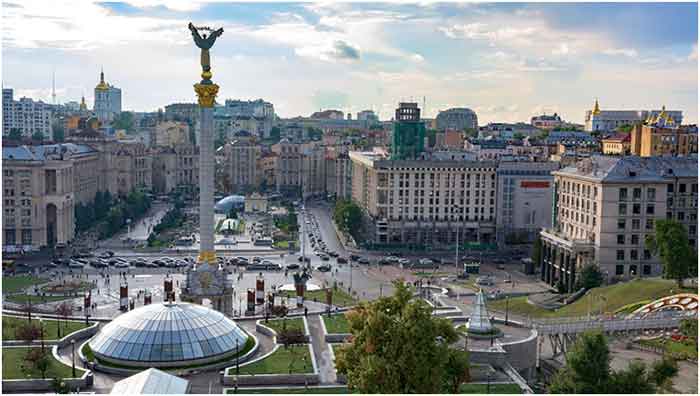
Maidan Square, Kiev
-2-
What do most Americans know about Ukraine? What do we know about History?
We are spoon-fed propaganda from the earliest grades. In my generation, any class activity could be interrupted any moment with the voice of the principal, booming out of the P.A. box: “Take Cover!”
And then, 25-30 children and pre-teens would dive under our wooden desks. Covering our heads with our hands, we averted our eyes from soon-to-be smashed windows which the Russian A-bombs would obliterate along with us and everyone we knew! After 5 minutes or so, the alarm would signal the “all clear,” and we could emerge, happy to survive yet another day in “the home of the brave.”
Through some quirk of nature, I saw through the charades sooner than most. Around the fourth grade, I figured I could just mime the words to the “Pledge of Allegiance” and the other kids would drown out my silence. So, hand over my heart, I mimed, looked earnest…and the teacher never knew….
Still wondering about the world that I was ill-prepared to enter, I lived through the “Cuban Missile Crisis.” Nobody talks about that now, but for a dozen days or so, we truly believed we were on the verge of nuclear extermination—verily, the “war to end all wars.” The war to end “peace,” and everything else besides….
“Life’s but a walking shadow,” Shakespeare mused:
“A poor player that struts and frets his hour
Upon the stage, and then is heard no more.
It is a tale told by an idiot—
Full of sound and fury, signifying nothing….”
Yes, it can be that way! Especially in our age of mass-media, with “memes” substituting for thoughts, dialectical strutting in place of dialogical exploring.
In my 40s, I was at a writers’ conference in Connecticut, with dramatic presentations of works in progress. I met a man associated with the Academy there: a tall, robust fellow, introducing himself as Ukrainian. “So am I!” I proudly proclaimed. And, we became friends… briefly.
The next day, he asked if I were “Greek Orthodox,” and I explained that I was not attached to any religion, open to various religious, philosophical and spiritual beliefs. I mentioned that my father had been raised as a Roman Catholic (but, he, too, was a free-thinker) and my mother might, if pressed, classify herself as a “reformed Jew.” On the last word, my almost-friend frowned, excused himself from the table…and that was the end of that….
3.
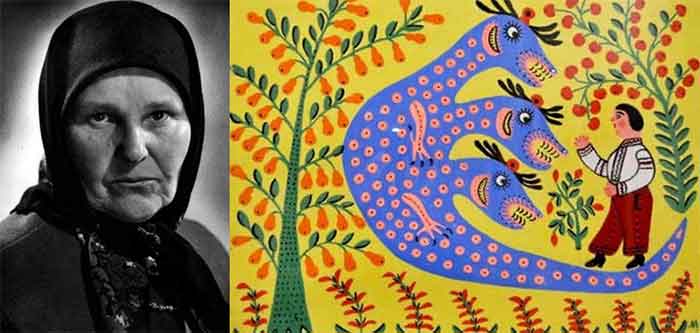
Renowned Ukrainian folk artist Maria Prymachen, whose museum in Kiev–built in her honor, housing many splendid examples of her naïve and fanciful work, was bombed and incinerated during the Russian invasion of February, 2022.
What do we know of Ukraine?
My Socialist friends, and former friends, abide in their belief that Russia saved the world from “Hitlerism.” They forget, or do not know, about the Kulaks.
There were two terrible holocausts in the 1930s and 1940s. The first one, in the ‘30s, occurred when Stalin imposed his maniacal policies against independent, prosperous farmers in Ukraine—the “Kulaks.” The dictator was determined to show the world the success of his 5-year plans; determined, as well, to get any independent-minded “free-thinkers” to tow-the-line.
So, he told the farmers how to farm their land, taxed their waning yields to extinction, had the KGB arrest the dissonant, and within a year, the “breadbasket of Europe” was a wasteland (emulating the British-instigated Irish potato famine of 90 years before!). Three million children died of starvation, along with four million adults. That was the first holocaust of the 20th Century, soon followed by the Jewish holocaust; followed by the 3-day holocaust of Hiroshima and Nagasaki….
Is it not extraordinary? 76 years after August, 1945, we have not eliminated the threat of nuclear war! Nearly 8 billion of us—better connected than ever, sharing a shrinking planet—beautiful, fragile and endangered…but, do we wonder enough: What are we bequeathing the children…and our children’s children?
Who is in control? How do we deem ourselves “free and independent” when we have surrendered autonomy and agency?
How little we know about each other…and ourselves….
I walked to the top of a hill and looked down on the Dnieper River—one of Europe’s major waterways.
From my perch in a green hilltop park, I watched couples and families saunter and converse, children play, as young men and women glided by on roller skates—all full of life and zest, and the promise of life to be fulfilled.
I saw the water of the Dnieper sparkle, and the sun sparkle on the golden domes of churches, far and wide.
I had entered one of those churches the day before, surprised that there was no guard, no attendant to question me, to bar my entry. The interior was dimly lit, with light filtered through stained-glass windows. I stood in the back, in the shadows of a corner, admiring and imbibing the serenity.
I remembered when my Aunt Sadie had taken me to a Christmas Mass at a Roman Catholic church in Staten Island—my first, and last, such Mass…. I didn’t understand the Latin, of course, and soon my little bones grew tired of all the standing and sitting…. But, as my aunt prayed, I thought that I saw her as I had never seen her, with inner light…and she was beautiful.
A young woman entered the church in Kiev. In another corner, she lit a votary candle, knelt and prayed. I couldn’t see her face. I felt her peace, and I left quietly….
*
On the weekend, traffic was diverted from the main boulevard. Hundreds, maybe thousands, of people would meet on the street and sidewalks, congregate at little shelters to see the work of local artists—to question and admire, to bargain and purchase. There were musicians, too, and couples danced in the street, and children danced and frolicked, being children.
The day I was leaving, I stood in the square in front of the hotel, near yet another church. An older woman approached me and started talking to me as though she knew me.
And, somehow, though we couldn’t understand a word the other spoke, I felt that I knew her.
She wanted to give me something…but… I didn’t know her….
She held out her hand, and took my hand, and gently pressed a St. Christopher medal in my palm. But, how did she know I would be traveling that day?
And I thought: her relatives might have known my relatives—long ago, when they were children. They played together, and explored together. Perhaps my grandparents had delighted her grandparents; my quiet grandfather had been less quiet then, when the world reverberated with the laughter of children.
How can we free the children within us? Jew and Gentile, Palestinian and Israeli, Muslim and Hindu, Black and White, Yellow, Red and Brown—are we not more alike than different? Shall we learn racial “theories” as we grow older; or shall we learn to dance with one another, tell jokes, play games, share the enlightenment of Art and Music and wonder?
Where are the leaders to lead us out of the wilderness of prejudice and fears? Is it too late? Where are the teachers and explorers?
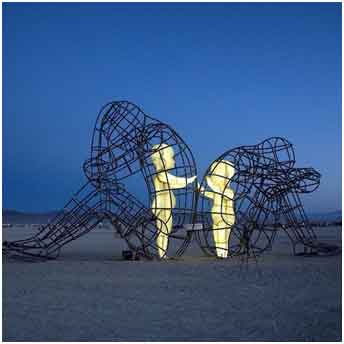
“LOVE” by Ukrainian artist Alexander Milov. The child in one adult reaches out to the child in another adult. Can we cultivate such connections?

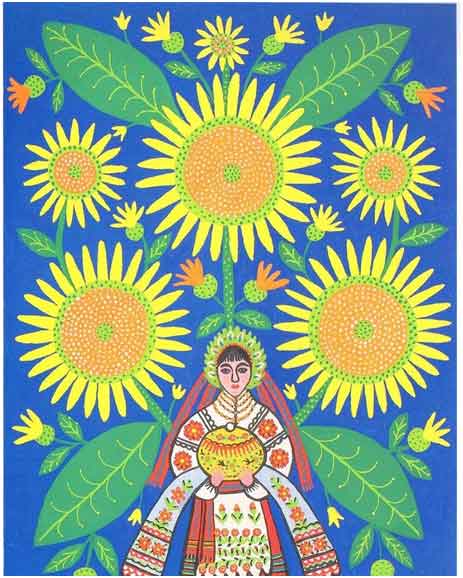
A painting by Ukrainian folk artist Maria Prymachen,whose museum in Kiev, built in her honor, was bombed and incinerated during the Russian invasion of February, 2022.
“Farewell the tranquil mind! Farewell content!
Farewell the plumed troops and the big wars
That make ambition virtue!”
–William Shakespeare
Gary Steven Corseri is the grandson of Ukrainian-Jewish and Sicilian-Catholic immigrants. He has performed his poems at the Carter Presidential Library and his dramas have been produced on PBS-Atlanta and in universities, high schools and Little Theaters. He has published 2 novels, 1 full collection and 1 prize-winning chapbook of poems. His poems, articles, fiction and dramas have appeared in hundreds of global publications & websites, including: Countercurrents, Redbook Magazine, Village Voice, The Miami Herald, Atlanta Journal, The Philadelphia Inquirer, The New York Times, and Transcend Media Service. He has taught at universities in the U.S. and Japan, and in US prisons and public schools. He has worked as a grape-picker in Australia, a gas-station attendant, and an editor.

